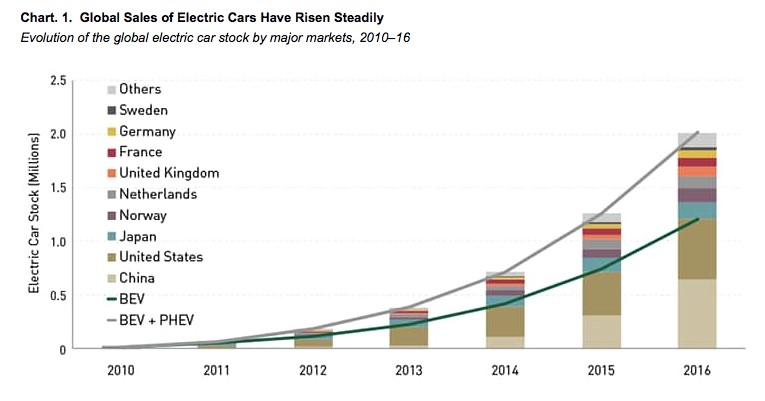As adoption of electric vehicles accelerates, there’s one potential industry that may lose big as road-trip lifestyles change and the indirect threat trickles down.
The industry is beverages, and the threat is not about electric vehicles themselves, but the gas stations that will go out of fashion as they make way for charging stations.
While it may seem like a benign threat, it’s anything but, say Morgan Stanley analysts, who note that the beverage sector will suffer from fewer stops to shop by drivers who will need less fuel.
Fuel accounts for only 40 percent of profit for gas stations, and most of the profit is made inside the store.
The claims were backed up by a recent survey conducted by the National Association of Convenience Stores that showed that nearly half of all convenience store customers mainly went into the store to buy a beverage.
While the Morgan Stanley’s note didn't touch on snack makers, they will likely be impacted by fewer fuel visits, too. Alcoholic drinks and tobacco products sold at convenience stores may not take the same hit.
“Despite lower exposure to gas stations, we see nonalcoholic ready to drink beverages (~11 percent) more at risk than beer (~33 percent) given impulse purchases and immediate consumption,” Morgan Stanley wrote.
Some would argue that this is a natural process, and a natural progression.
Similar fears were raised when people first started fueling up their own cars at the pumps and gas station jobs were threatened. In some countries in Eastern Europe and Asia, one can still fill up without getting out of the car. In North America and Western Europe, the gas station attendant is extinct.
But the world didn’t end, and everyone adapted. The beverage industry will too—both retailers and wholesalers—as long as they time their jump onto the EV train well.
Estimates are that electric cars would take 35 percent of the global market by 2025 and 48 percent by 2030.

(Click to enlarge)
Even though electric vehicles still enjoy only a tiny market share, the auto industry is betting billions that they will soon be as cheap as conventional cars. However, there are still few things that have to line up in order to achieve that goal.
Related: U.S. IPOs See Booming First Quarter
First, the cost of building motors and components will have to continue to decrease. Experts agree that electric vehicles will go mainstream when the cost of the batteries is low enough to make it the same price to own a conventional car that runs on gasoline or diesel.

(Click to enlarge)
Merrill Lynch analysts expect electric vehicles in the United States will be cheaper than their traditional counterparts by 2024. Just a year ago, they estimated it would take until 2030. Battery prices, measured by the power they produce, have already fallen by more than half since 2011.
In order for electric cars to become commonplace, more charging stations will need to be built.
Considering the fact that the average range of an electric car is 180 miles, compared to 460 miles for a gasoline-powered car, the wide availability of charging stations is crucial. They’ll also need to able to charge faster.
There are already about 16,000 public charging stations in the United States, up from a few hundred in 2010. Still, that pales in comparison to the approximately 112,000 gas stations.
And then, there is a traditionalism, and fear of the unknown, which is likely to decrease with the change of generation as it always does. Most of the car buyers, Generation X and older Millennials, still find it hard to go electric. Speed, shifting gears and in some rare cases the smell and sound of petrol engine continues to hold some allure.
Related: 5 Stocks That Can Weather The Global Trade War
With all of this in mind, convenience store retailers have plenty of time to respond and make a strategy for moving forward with the future.
There is no doubt that the beverage industry will adapt to the trends, perhaps by installing charging stations, or making a fully-automated beverage and snack shop next to the EV charge-ups. Since EVs are the future, it’s not hard to see a marriage of something like Amazon GO’s checkout-less shops and charging stations.
On the flip side, if the beverage industry and convenience store segments are too slow off the starting blocks and fail to get in front of the future in time, fast food restaurants and coffee shops like Starbucks might be the immediate beneficiaries when it comes to beverages.
By Fred Dunkley for Safehaven.com
More Top Reads From Safehaven.com:
















